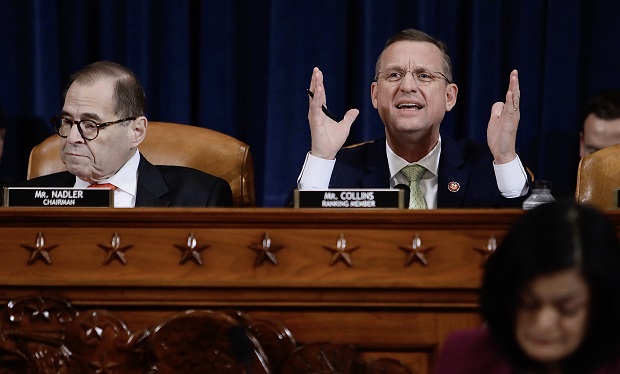'We Do Not Need Permission From the Courts': House Judiciary Advances Articles of Impeachment
Republicans called for Democrats to go to court to get more evidence before voting on the articles. Democrats said they can't wait, labeling President Trump a threat to the 2020 election.
December 13, 2019 at 10:15 AM
5 minute read
 Reps. Jerry Nadler, D-New York, left, and Doug Collins, R-Georgia, during a hearing on amendments to two articles of impeachment before the House Judiciary Committee Thursday. Photo: Diego M. Radzinschi/ALM Media
Reps. Jerry Nadler, D-New York, left, and Doug Collins, R-Georgia, during a hearing on amendments to two articles of impeachment before the House Judiciary Committee Thursday. Photo: Diego M. Radzinschi/ALM Media
The House Judiciary Committee on Friday voted in favor of two articles of impeachment against President Donald Trump, setting the stage for him to become the third U.S. president in the nation's history to be impeached.
Both votes were 23-17, along party lines, approving articles of impeachment on abuse of power and obstruction of Congress.
During a contentious 18-hour proceeding that stretched over three days, Democrats said the evidence shows that Trump pushed for Ukraine to investigate his political rival, former Vice President Joe Biden, while he withheld military aid, and then stonewalled the House's efforts to investigate it.
The House is expected to vote on the articles of impeachment next week.
Only Presidents Andrew Johnson and Bill Clinton have been impeached. Both were acquitted during a Senate trial, the same fate Trump is expected to face in the GOP-controlled chamber. President Richard Nixon resigned when it became evident that he would be impeached and removed from office.
"The central issue of this impeachment is the corruption of our institutions that safeguard democracy, by this president," House Judiciary Committee Chairman Jerry Nadler said.
"No president is supposed to be a dictator in the United States," Nadler continued. "When I hear colleagues of mine arguing that Congress is unpopular and therefore obstruction of Congress is a good thing, it shows terrible ignorance, a lack of care for our institution, for our democracy, for our form of government, for our liberties."
"I, for one, will do everything I can to protect our liberties, our democracy, our free and fair elections, and the separation of powers that says Congress and the president and the judiciary check each other, and nobody can be a dictator," he added.
Republicans charged the House did not have enough evidence to impeach Trump. They argued that Democrats should have gone to court to enforce their subpoenas for testimony and documents needed in the investigation, rather than move forward with what they described as a "wafer thin" record.
They further claimed that Democrats have long sought to impeach Trump, and that the Ukrainian allegations are a front for their actions.
"The lie is that the sham impeachment is OK because the threat is so real and so urgent and so imminent," Rep. Doug Collins, the top Republican on the Judiciary Committee, said during his opening statement. "The big lie is that political expediency is honorable and justifiable, and history has shown that to be untrue and dangerous."
Democrats refuted those claims, saying Trump represents a continuing danger and will prevent the United States from having legitimate elections in 2020.
And they challenged Republicans to consider their own legacy, if they don't vote to impeach Trump.
The consideration of the articles of impeachment began Wednesday night, as each member of the Judiciary Committee delivered opening statements.
And it carried over into Friday, as the members debated the articles of impeachment.
Several members of the House Judiciary Committee noted their past participation in those impeachment proceedings. Rep. Zoe Lofgren, who was a staff attorney on the Judiciary panel for the Nixon impeachment and was on the committee for the Clinton impeachment, looked to the past as she urged lawmakers to approve the articles.
Lofgren pulled out a copy of the Oct. 8 letter from White House counsel Pat Cipollone, in which Cipollone said the Trump White House wouldn't cooperate with the impeachment inquiry.
"This isn't something that needs to be adjudicated by the third branch, the judicial branch, because there's no privilege being asserted here. It's simply 'no.' That's never happened before," the California Democrat said. Lofgren later entered the letter into the record.
And Rep. Madeleine Dean, a freshman Democrat, noted that the Constitution grants the House the "sole" power of impeachment, "not shared with the executive."
"It's a civics lesson," Dean said. "Don't let the other side, who have such talented constitutional attorneys over there, distract you."
"We do not need permission from the president, we do not need permission from the courts. In fact, we have an obligation to do our job under this simple, smart document," she continued, holding up a copy of the Constitution.
But Republicans on the committee, some of whom were also present for prior impeachments, insisted that the courts were the proper vehicle to handle the fight between the House and the White House, and there was too little evidence to advance the articles.
"Instead of go to the court—which you're supposed to do, they're kind of the referee between the legislative and executive branches—they said, 'no, we're not going to go to court. We're just going to impeach this guy,' which is what they've wanted to do since he got inaugurated," said GOP Rep. Steve Chabot, who was a House manager during the Clinton impeachment.
Read more:
Forget the 'Trump Bump.' Law School Enrollment Dipped a Bit in 2019
Former Justice Dept. Leaders Slam Barr's Commentary on Inspector General's Report
Hundreds of Law Profs Declare Trump's Conduct 'Clearly Impeachable'
Pam Karlan: Trump Has 'Doubled Down on Violating' Presidential Oath
This content has been archived. It is available through our partners, LexisNexis® and Bloomberg Law.
To view this content, please continue to their sites.
Not a Lexis Subscriber?
Subscribe Now
Not a Bloomberg Law Subscriber?
Subscribe Now
NOT FOR REPRINT
© 2025 ALM Global, LLC, All Rights Reserved. Request academic re-use from www.copyright.com. All other uses, submit a request to [email protected]. For more information visit Asset & Logo Licensing.
You Might Like
View All
Trump's DOJ Delays Releasing Jan. 6 FBI Agents List Under Consent Order
3 minute read
Judge Grills DOJ on Trump’s Birthright Citizenship Executive Order

Perkins Coie Backs Challenge to Trump's Ban on Transgender Military Service
4 minute read
Selendy Gay Files Lawsuit Challenging Trump's Workforce Reclassification EO
2 minute readTrending Stories
- 1Donald Trump Serves Only De Facto and Not De Jure: A Status That Voids His Acts Usurping the Power of Congress or the Courts
- 2Georgia Hacker Pleads Guilty in SEC X Account Scam That Moved Markets
- 3Trump's Pick for SEC Chair Likely to Stymie Shareholder Proposals from ESG Advocates
- 4Adobe’s Chief Cyber Legal & Privacy Officer Talks Managing Gen AI Risks, Cyber Training
- 5The M&A Partners Who Drove the Most Business as Deal Leads Last Year
Who Got The Work
J. Brugh Lower of Gibbons has entered an appearance for industrial equipment supplier Devco Corporation in a pending trademark infringement lawsuit. The suit, accusing the defendant of selling knock-off Graco products, was filed Dec. 18 in New Jersey District Court by Rivkin Radler on behalf of Graco Inc. and Graco Minnesota. The case, assigned to U.S. District Judge Zahid N. Quraishi, is 3:24-cv-11294, Graco Inc. et al v. Devco Corporation.
Who Got The Work
Rebecca Maller-Stein and Kent A. Yalowitz of Arnold & Porter Kaye Scholer have entered their appearances for Hanaco Venture Capital and its executives, Lior Prosor and David Frankel, in a pending securities lawsuit. The action, filed on Dec. 24 in New York Southern District Court by Zell, Aron & Co. on behalf of Goldeneye Advisors, accuses the defendants of negligently and fraudulently managing the plaintiff's $1 million investment. The case, assigned to U.S. District Judge Vernon S. Broderick, is 1:24-cv-09918, Goldeneye Advisors, LLC v. Hanaco Venture Capital, Ltd. et al.
Who Got The Work
Attorneys from A&O Shearman has stepped in as defense counsel for Toronto-Dominion Bank and other defendants in a pending securities class action. The suit, filed Dec. 11 in New York Southern District Court by Bleichmar Fonti & Auld, accuses the defendants of concealing the bank's 'pervasive' deficiencies in regards to its compliance with the Bank Secrecy Act and the quality of its anti-money laundering controls. The case, assigned to U.S. District Judge Arun Subramanian, is 1:24-cv-09445, Gonzalez v. The Toronto-Dominion Bank et al.
Who Got The Work
Crown Castle International, a Pennsylvania company providing shared communications infrastructure, has turned to Luke D. Wolf of Gordon Rees Scully Mansukhani to fend off a pending breach-of-contract lawsuit. The court action, filed Nov. 25 in Michigan Eastern District Court by Hooper Hathaway PC on behalf of The Town Residences LLC, accuses Crown Castle of failing to transfer approximately $30,000 in utility payments from T-Mobile in breach of a roof-top lease and assignment agreement. The case, assigned to U.S. District Judge Susan K. Declercq, is 2:24-cv-13131, The Town Residences LLC v. T-Mobile US, Inc. et al.
Who Got The Work
Wilfred P. Coronato and Daniel M. Schwartz of McCarter & English have stepped in as defense counsel to Electrolux Home Products Inc. in a pending product liability lawsuit. The court action, filed Nov. 26 in New York Eastern District Court by Poulos Lopiccolo PC and Nagel Rice LLP on behalf of David Stern, alleges that the defendant's refrigerators’ drawers and shelving repeatedly break and fall apart within months after purchase. The case, assigned to U.S. District Judge Joan M. Azrack, is 2:24-cv-08204, Stern v. Electrolux Home Products, Inc.
Featured Firms
Law Offices of Gary Martin Hays & Associates, P.C.
(470) 294-1674
Law Offices of Mark E. Salomone
(857) 444-6468
Smith & Hassler
(713) 739-1250








